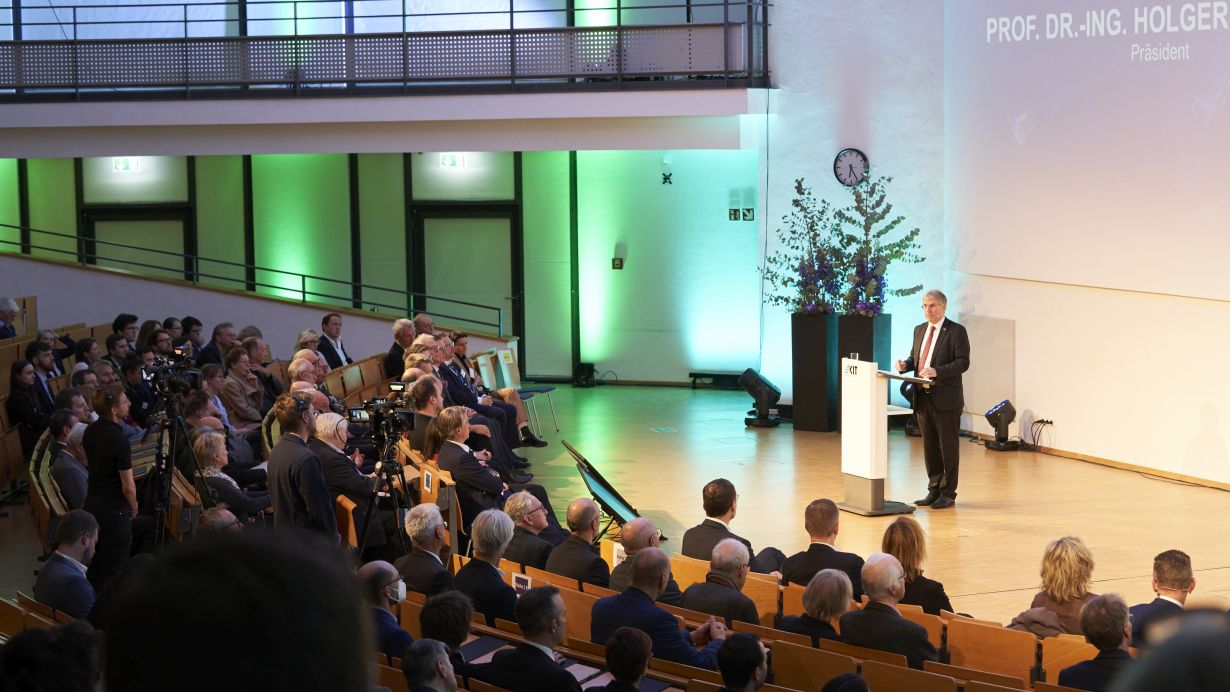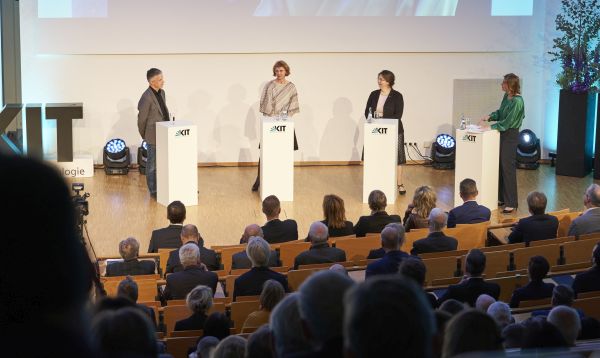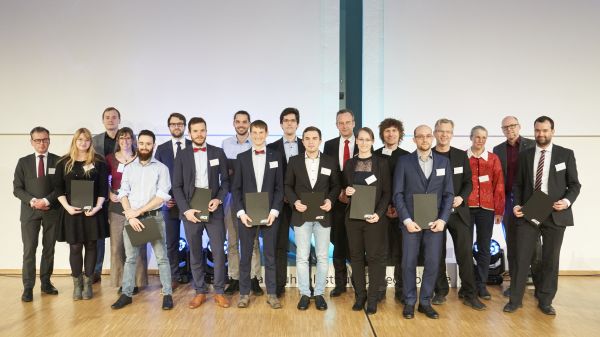
The mass of neutrinos, the origin of cosmic radiation, or the nature of dark matter and dark energy in the outer space - Karlsruhe Institute of Technology (KIT) is doing research on many fundamental questions about the nature of our universe. This involves large-scale experiments that shed light on the smallest structures of matter or take a special look at cosmic events. "Our Universe" is also the title of the Science Year 2023 proclaimed by the German Federal Ministry of Education and Research. The KIT Annual Celebration 2023 provided insights into different facets of this topic.
"As the research university in the Helmholtz Association, KIT has unique large-scale research infrastructures. This includes those dedicated to the exciting questions of astrophysics, high energy physics, and related disciplines," said Professor Holger Hanselka, President of KIT at the Annual Celebration. "With the large-scale experiment KATRIN, for example, we operate the most sensitive scales in the world to determine the mass of neutrinos. At the Pierre Auger Observatory in Argentina, which represents the world's largest experiment for measuring cosmic radiation, KIT is in charge of project management."
He is convinced that, in the face of growing geopolitical uncertainties, the unifying power of science is becoming more and more important. "The fascination with the respective research subject and the joint scientific work build bridges between nations - not only in astrophysics, cosmology, or research on elementary particles, but in all research fields and disciplines," said Hanselka. "For example, the KATRIN collaboration involves 150 researchers from 20 institutions in seven countries, and more than 400 researchers from 17 countries take part in the Pierre Auger collaboration."
Second KIT Further Development Act Strengthens Top-Level Research, Teaching, and Transfer
It was of particular significance for the development of KIT in the past twelve months that the 2nd KIT Further Development Act entered into force on January 1, 2023. Instead of the former division into two areas, KIT now has two tasks of equal importance: "With the two equally important tasks, the university function and the large-scale research responsibilities, new options and more autonomy for decisions and the management of KIT are opening up - thus, the top-level research, teaching, and transfer areas will be strengthened even further. This allows KIT to offer an even more attractive research environment for researchers from all over the world," Hanselka summarizes the new potentials for KIT. "Together with the federal and state governments, we have opened a whole new chapter in the further development of KIT."
Professor Sabine Döring, Undersecretary of State at the Federal Ministry of Education and Research, said: "The theme of the KIT Annual Celebration is 'Our Universe', just like for the Science Year. This topic captivates us all. We have always been trying to decipher the universe. KIT makes a valuable contribution here, for example, by taking the lead in the direct measurement of neutrino mass with the KATRIN experiment. KIT is also involved in the study of cosmic radiation and the search for dark matter, which counts among the biggest open questions in astrophysics. This will help us understand the universe and its history even better. For this endeavor and for the future in general, I wish KIT every success!"
Professor Michael Kaschke, Chairperson of the KIT Supervisory Board, emphasized the new opportunities for KIT: "The entry into force of the 2nd KIT Further Development Act will endow KIT with greater freedom of action compared to other scientific institutions in Germany, which should be exploited to the full. In the light of this, all of us should contribute in making KIT even more visible internationally as a special beacon of the German science system and in placing us permanently among the top 30 in the world."
Dr. Albert Käuflein, Mayor of the City of Karlsruhe, referred to two upcoming highlights to be organized this year: "The City of Karlsruhe and KIT have been cooperating closely and successfully for many years - this also includes science events. We are pleased that, also this year, KIT will make many contributions to the Karlsruhe science festival 'EFFEKTE', which will celebrate its tenth anniversary in June. In October, the City of Karlsruhe will participate in the second KIT Science Week, which originated from KIT's successful excellence proposal."
Discussion Panel: Looking into the Universe - Using High-Tech to Find Answers to Questions of Humanity
Together with host Nicole Krüger, three KIT researchers discussed the major questions of fundamental research in physics, which are also the focus of the Science Year 2023 - Our Universe: Professor Markus Klute, Head of the Institute of Experimental of Particle Physics (ETP), Professor Milada M. Mühlleitner, Director of the Institute for Theoretical Physics, and Professor Anke-Susanne Müller, Head of the Institute of Beam Physics and Technology and spokesperson of the KIT Elementary Particles and Astroparticle Physics Center.

(from left to right) talking with host Nicole Krieger about the universe, its smallest particles,
and how research wants to track them down (photo: Amadeus Bramsiepe, KIT)
KIT Department Teaching Awards 2022: Award for Research and Application-Oriented Teaching
With the Department Teaching Awards, the Executive Board of KIT honors individuals, working groups, or organizational units of KIT departments responsible for teaching whose courses stand out particularly by research and application-oriented teaching modules as well as new forms of teaching and learning, the interdisciplinary nature or high topicality of the imparted expert knowledge.
Professor Alexander Wanner, Vice President for Higher Education and Academic Affairs of KIT, awarded the prize to 14 teachers at the Annual Celebration. The prize, including prize money of EUR 10,000 each, is offered annually to the eleven KIT departments.
More information about the faculty teaching awards with video portraits of the award winners

particularly research and application-oriented teaching modules.
(Photo: Amadeus Bramsiepe, KIT)
Being "The Research University in the Helmholtz Association", KIT creates and imparts knowledge for the society and the environment. It is the objective to make significant contributions to the global challenges in the fields of energy, mobility, and information. For this, about 9,800 employees cooperate in a broad range of disciplines in natural sciences, engineering sciences, economics, and the humanities and social sciences. KIT prepares its 22,300 students for responsible tasks in society, industry, and science by offering research-based study programs. Innovation efforts at KIT build a bridge between important scientific findings and their application for the benefit of society, economic prosperity, and the preservation of our natural basis of life. KIT is one of the German universities of excellence.






